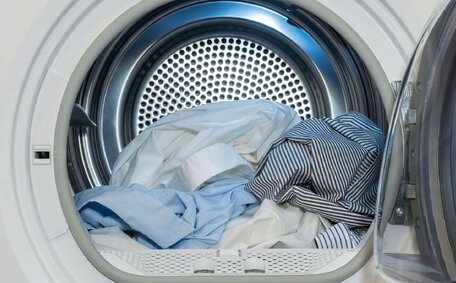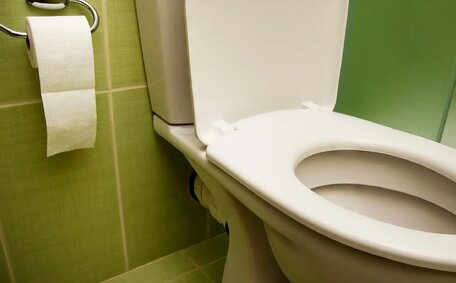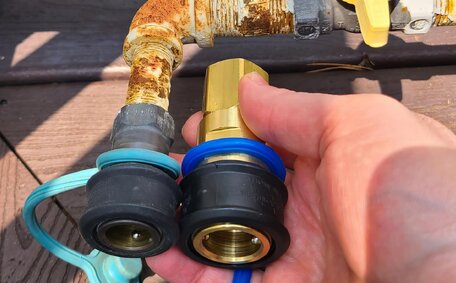Introduction to DIY gas fitting: What you need to know first
Professionals always prioritise safety in plumbing and gas fitting, especially with complex installations.
Water heater systems and other gas appliances are complex, and making unauthorised adjustments is not only dangerous but often illegal to do. Homeowners may find that legal restrictions complicate the DIY approach to seemingly simple plumbing and gas fitting tasks.
When it comes to water lines, plumbing, and working with gas fittings, Ryde Plumbing cautions homeowners to carefully consider both safety issues and local regulations before attempting any DIY gas work around the house, as some projects can present unexpected hazards.
Knowing how to protect your plumbing from potential issues is crucial; using uncertified parts or incorrect procedures could jeopardise your safety. This guide details crucial factors for safe and secure plumbing and gas fitting at home, pinpointing jobs done correctly.
Subsequent sections offer guidance to maintain safety when installing fixtures and help you identify when to enlist a plumber for tasks beyond DIY. We identify DIY projects to avoid, like those involving gas lines or rainwater tank plumbing, which necessitate professional assistance.
Our goal is to inform you about the plumbing projects that comply with building codes and are safe when it comes to basic installations such as a towel rack, and those that aren’t, guiding you to manage risks and to know when to seek professional assistance.
Safety considerations and hidden risks
When working with gas fittings and systems, ensure safety is the top priority for any projects around the house, keep in mind that it’s illegal to do certain gas works without a licence. DIY work on some gas systems is illegal and risky due to potential leaks or explosions. Calling a plumber is prudent, as some hazards are not immediately obvious.
During renovations, especially in historical properties, some tasks like dealing with asbestos should not be done alone and require professional involvement. Professional plumbers follow essential safety protocols for building work, including the identification and safe handling of asbestos and problematic gas conduits. On the other hand, attempting this without ample knowledge of the necessary precautions may pose serious health hazards.
We strongly urge you to seek professional help when weighing the pros and cons of DIY plumbing, and make sure to exercise due caution should you opt to undertake tasks involving natural gas at your residence.
For complex DIY plumbing tasks, consider a licensed plumber valued for their training, protective gear, and hazard management certification. Adhering to strict safety protocols, our team ensures that DIY plumbing repairs comply with regulations, using safe fittings and approved materials. Avoid risks with gas systems - consult our experts at 1300 349 338 for professional advice tailored to your needs.
Legal requirements for DIY gas fitting
In DIY gas fitting, assess what’s legally permissible and off-limits, understanding that compliance is crucial to avoid fines or penalties. laws differ by region, yet certain tasks, such as working on gas lines or working with gas in general, are almost always illegal to undertake and should stay within the purview of licensed professionals.
In New South Wales, it’s frequently illegal for unlicensed homeowners to work on gas fittings, including tampering with appliance connectors, beyond the gas isolation valve. To be legally compliant, installations, changes, disconnections, or repairs on gas systems must be performed by licensed professionals.
It’s wise to contact local council authorities to understand regional legislation before commencing any gas-related home improvement. Our expert team is up-to-date on the latest regulations to ensure flawless connection of gas fixtures throughout Sydney and greater NSW. Call Ryde Plumbing on 1300 349 338 for guidance to ensure you avoid unintentional violations.
When to hire a professional
Although you may be eager to handle basic water system tasks such as installing gas regulators or replacing flexible hoses, we recommend professionals for tasks that may seem DIY-friendly but carry substantial risks:
- DIY installation of gas appliances such as cookers, water heaters, and pool heaters is illegal and requires professional gas fitting.
- Replacing old gas pipes that may contain hazardous materials like asbestos
- Making structural changes like adding elbows or tees to rigid gas lines
- Installing a new toilet or decommissioning gas lines or having gas services disconnected
- If unable to conclusively identify the type of gas for existing pipework
- For any work extending beyond the gas isolation valve to appliances
- If ever unsure about legal requirements or have safety concerns
Our certified professional plumbers offer necessary expertise to manage complex tasks while highlighting risks inherent in DIY projects. We follow precise protocols and use only approved materials to mitigate all risks, ensuring your DIY endeavours remain within safe boundaries, but we recognise that some projects get into areas requiring professional help if necessary. Don’t take chances with DIY gas projects - call 1300 349 338 to arrange inspections and quotes for worry-free solutions perfectly suited to your needs.
Potential DIY gas fitting projects
Before you start DIY projects involving gas, begin with low-risk tasks that set a sound foundation. Savvy homeowners can tackle straightforward tasks themselves, but always after confirming legality and regulations with local authorities:
- Replacing flexible gas connectors on appliances
- Installing isolation valves to switch off gas supplies
- Replacing a faulty valve washer on gas taps, which can effectively prevent leaks
- Undertaking simple pipe fitting projects like fitting Grillpoint gas regulators for LPG cylinders
- Swapping unsafe pipe fittings with gas-rated stainless steel or brass compression or flare fittings, which you can buy from certified suppliers
Nonetheless, consider several factors before starting these seemingly simple tasks, as even the most straightforward plumbing repairs demand meticulous attention.
Always disconnect the gas, use certified components, test for leaks, and avoid altering rigid gas lines. Enlist specialist plumbers for their expertise in handling complex issues, offering quotes and executing hassle-free gas fitting repairs.
Tips for preparing for a DIY gas project
Careful planning is essential and remains vital to doing the job right, especially when applying your DIY skills to gas fitting tasks. To ensure safe and successful connection of gas pipes to appliances, adhere to these crucial tips regarding the use of correct and safe fittings:
- Consult local councils to avoid any mix-ups with plumbing works and not end up breaching legislation and restrictions in your area.
- Turn the gas back from the mains and isolate the working area for safety during your piping tasks.
- Ensure you’ve identified what need - tools such as spanners, adjustable wrenches, teflon tape, soapy water, and a manometer.
- Have certified gas parts ready - flex hoses, valves, regulators, specifically pipe fitting materials. Never improvise; always use the correct fittings to keep your system safe and use certified products.
- Examine diagrams of current gas systems to ensure connections, including male to female pipe fittings, are restored correctly.
- Clean all joint areas thoroughly and remove old thread tape to ensure tight seals.
- Perform leak checks with soapy water once assembled. Never test for leaks with an open flame!
Even straightforward gas tasks may require a moment to decide whether professional assistance is necessary. Call 1300 349 338 if unsure about any aspect of your project. Our gas fitting team can provide guidance to maintain the safety of you, your family, and your property.
Guided Steps for Safe DIY Gas Tasks
When tackling basic DIY gas tasks that could lead to water damage or plumbing issues, remember that safety should always remain your top priority. Carefully follow these instructions, which can ensure the safety of your water system while working with gas lines:
- Turn off the gas supply at the main isolation valve and ensure any pilot lights are extinguished.
- Assemble necessary tools - adjustable wrenches, thread tape, manometer, soapy water, etc. Use only certified gas parts and fittings.
- Clean joint areas thoroughly and apply gas-rated thread tape to ensure tight seals.
- Follow manufacturer instructions precisely when replacing gas connectors, valves, regulators, etc.
- Reestablish connections properly, ensuring no mistakes and referencing diagrams if needed to preserve infrastructure.
- After reassembly, conduct thorough leak checks with soapy water, as this crucial step ensures safety.
- Contact your gas supplier to turn supply back on once the job is complete.
- Verify appliance functionality - remember, no naked flames for testing!
DIY gas tasks demand meticulous care. Consult our experts if ever unsure - call 1300 349 338 for guidance from licenced professionals who make safety the priority.
When to stop and call a professional
Understanding what you can do and why you might want to call a plumber for basic gas jobs is crucial for maintaining safety and adhering to legal standards. Seek the assistance of a plumber for your specific needs immediately in any of these scenarios:
- If at any point you’re not confident about safety, unsure of the next steps, or the work exceeds what you want to do
- Notices signs of corrosion, damage, or leaks in existing gas infrastructure, which could also indicate a need for professional repair
- Unsure if fittings, connectors or appliances are certified for use with gas
- Work involves structural changes like altering rigid gas lines
- Modifying gas supplies to amenities such as pools, spas, or your kitchen’s gas fixtures
- Decommissioning gas lines or having gas services fully disconnected
Our fully licensed gas technicians at Ryde Plumbing are on call 24/7, ready to offer guidance that saves both time and money, providing cost-effective solutions for complex tasks where DIY efforts fall short. We handle all necessary permitting, ensure compliance with regulations, and carry out insurance claims management by providing certified reporting once jobs are complete. Most importantly, our plumbers can guarantee reliable, safe solutions that respect your budget and ensure all tasks are carried out to the highest standards.
Avoid risks with gas systems; instead, call 1300 349 338 for immediate, cost-effective support from qualified professionals. Contact us for inspections and quotes, or technical advice that can save money and hassles in your next gas fitting project, ensuring it’s smooth and worry-free.






